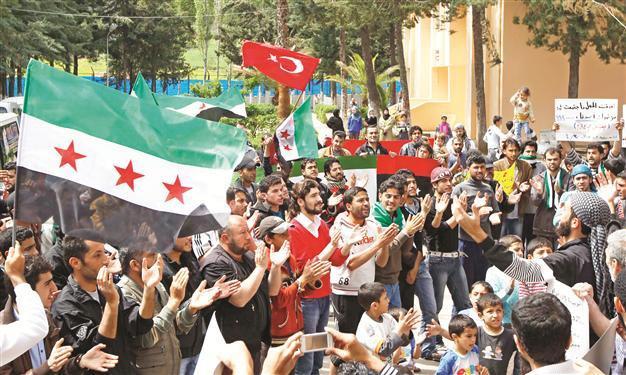Syria shelling continues despite UN peace plan
GENEVA

Syrian migrants wave Turkish and Syrian Independence flags during a protest against Syria’s President Bashar al-Assad at Yayladağı camp in southeastern Hatay province near the Turkish-Syrian border April 20. Syrian troops fired bullets and tear gas to disperse thousands of protesters in Aleppo and Hama, according to activists. REUTERS phot
The internationally-backed cease-fire in Syria is in a fragile state and the situation on the ground is not good, a spokesperson for the plan’s architect, Kofi Annan, said on April 20 as Syrian troops reportedly shelled the city of Homs and 10 members of security forces were killed by a roadside bomb in the south.Annan’s spokesperson Ahmad Fawzi said there were new victims of the violence every day. “The situation on the ground is not good. It’s a very fragile cease-fire,” Fawzi said, according to Agence France-Presse. Damascus signed a preliminary agreement on the work of the U.N. observers dispatched to Syria to monitor the cease-fire on April 19. Under this accord, observers will have complete freedom of movement and will be allowed to contact anyone they wish, said Fawzi.
That means they can travel by foot or car, take pictures and use technical equipment to monitor compliance with the cease-fire. The issue of using helicopters and aircraft, however, remains under discussion. The U.N. hopes to have 30 cease-fire monitors in Syria next week, and there are already plans for the deployment of up to 300, Fawzi said.
Blast kills 10 soldiers
The explosion of a 100-kilogram bomb in Sahm al-Jolan in the region of Quneitra killed 10 members of the security forces, state television reported, blaming the explosion on “terrorists.” Quneitra is located near the Israeli border, in the disputed Golan Heights. In the rebel-held Khaldiyeh neighborhood in Homs, a mortar round hit every five minutes, activists said. On April 20, protests were reported in Damascus and its suburbs, as well as in the northern city of Aleppo, the central regions of Hama and Homs, and in the southern Daraa province.
Troops fired bullets and tear gas to disperse thousands of protesters in Aleppo and Hama, activists said. The latest violence came hours after U.S. Secretary of State Hillary Clinton called for the U.N. Security Council to adopt an arms embargo and other tough measures against Syria on April 19. She acknowledged such diplomatic actions would likely be vetoed. One possible measure, Clinton said, would be for NATO to invoke its mutual defense treaty in response to “outrageous” shelling by Syria on its northern border, shared with Turkey, The Associated Press reported.
“Turkey is considering formally invoking Article Four of the North Atlantic Treaty, which triggers consultations in NATO when the territorial integrity, political independence, or security of any of the parties is threatened,” she said.
In the meantime, Turkish Prime Minister Recep Tayyip Erdoğan was scheduled to discuss Syria with Qatari Premier and Foreign Minister Sheikh Hamad bin Jassem al-Thani, as well as with Qatari Emir Sheikh Hamad bin Khalifa al-Thani in Doha late April 20. Responding to a question on Clinton’s remarks that a center to organize aid for Syrian migrants might be established in Turkey, Erdoğan told reporters from Doha that there is no information on this issue.
















